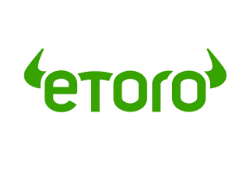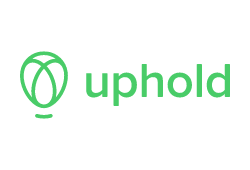Uphold is a popular platform allowing traders to buy and trade various assets, including cryptos and fiat currencies. You don't need a big budget to join Uphold, since you can trade with any amount.
The business also boasts high security and a wide selection of helpful apps to assist you on your trading journey.
Securities: crypto, fiat, commodities, environmental assets
Fortunly Rating
Fortunly's Rating: Our editorial team determines the rating based on a set of evaluation criteria developed for each product and service category.
- Commission-free trading
- Free funds storage
- Transparent fees
- Excellent cryptocurrency selection
- Wide selection of apps
- High spread fees on low-liquidity cryptocurrencies
Uphold Overview
Uphold is a multi-asset digital money platform allowing traders and investors to trade in precious metals, environmental assets, and national currencies.
Uphold was founded in 2015, and has since processed more than $4 billion in various transactions. The platform operates in 168 countries and is regulated by the US Financial Crimes Enforcement Network (FinCEN) and FCA in the UK.
Before we cover opening an Uphold account and other details, let's quickly compare it with a few other leading crypto exchange platforms.
How Uphold Compares to Other Trading Platforms

168
250+
Yes

100-plus
60-plus
Yes

190-plus
185-plus
Yes
Uphold, Kraken, and eToro all have mobile apps for trading on the go. However, Uphold is far ahead of eToro in terms of the number of supported cryptocurrencies.
Kraken, on the other hand, is closely behind Uphold in this regard, and works in more countries.
How Uphold Works
Uphold allows traders worldwide to start trading in their favorite asset with as little as $1, earn rewards for crypto staking, and buy and sell digital and other assets instantly.
You don’t have to worry about hidden costs because the fees are 100% transparent.
Available Accounts
You can open a personal or business account, depending on the scale of your trade.
Personal Account
The highlights of setting up a personal Uphold account are access to the multi-asset platform and commission-free trading.
You can exchange any asset for another (e.g., convert cryptocurrencies into fiat currencies), benefit from fast deposits, and deposit and withdraw funds at no cost (except for US credit and debit card deposits, and fees on crypto withdrawals).
You can also transfer funds from your bank account, card, or crypto wallet in no time when you log in to your account.
Business Account
Business account owners have access to the following features:
- Free funds storage: You can store your funds in as many currencies and assets as you need free of charge.
- Quick and cheap transfers: Account owners and their employees send and receive funds in their respective local currencies at minimal cost.
- Affordable currency conversion: Business people trading in forex can exchange 67 currencies and precious metals for a low price.
Opening an Account
- First, you need to hit the Sign up button on the Uphold website.
- Then, you'll have to specify your email address, phone number, and personal details.
- Once you complete step two, check your email for a confirmation link that will allow you to create a password.
- Next, state how you intend to use the platform and disclose your relevant financial information, such as how you generate funds and your employment status.
- The final step is identity verification: You'll have to take a selfie and upload a government-issued ID.
Once you complete these five steps, you can send money, withdraw funds, and exchange currencies, among other things.
Products
You can trade in various assets through your trading account, cryptos and precious metals are just some of them.
Cryptocurrencies
You can choose among 250+ cryptocurrencies to trade on Uphold, including major currencies, emerging tokens, stablecoins, and altcoins.
Bitcoin, Ether, Ripple, Litecoin, and Dogecoin are just a few of the tradable crypto options here.
Precious Metals
On Uphold, you can trade silver, gold, platinum, and palladium, and liquidate them into 27 currencies.
You'll enjoy seamless trading in these precious metals thanks to credit and debit card payments, bank connectivity in 36 countries, and blockchain integration networks in seven countries.
Environmental Assets
During our review, we found crypto assets made to be environmentally friendly, such as Universal Carbon (UPCO2) and Bitcoin Zero (BTC0). These tokens are sold to fund projects meant to help alleviate the effects of climate change.
The Uphold Wallet
To trade on the platform, you must create an Uphold crypto wallet.
Choose between Bitcoin, Bitcoin Gold, Bitcoin Cash, Litecoin, Ether, Dash, and Ripple digital wallets. You can use any of these to engage in cryptocurrency exchange, precious metals commerce, local fiat currency trade, and more.
Paper Wallet
Paper wallets provide exceptional security for your chosen assets, but you may find them challenging to set up because securing them tends to be tricky.
To set up the paper wallet, you need to download and install the Ubuntu OS, as well as Lili and BitAddress software.
Also, you’ll need to print your private and public keys, which you’ll have to keep safe, to use the wallet. They resemble a banknote with the public key on one side and the private key on the other.
Hardware Wallet
Hardware wallets are popular among experienced investors. Owners of this particular wallet can store their private key offline and choose to connect their “cold storage” to the computer only on brief occasions to complete transactions, which makes attacks difficult.
Web Wallet
Many beginners go with a web wallet because a web browser is all they need for installation. However, web wallets require private keys to be stored on a server, which may expose them to hackers.
Desktop Wallet
Desktop wallets are suitable for storing small to medium amounts of digital assets and provide satisfactory safety.
However, they may be compromised if the computer is permanently connected to the internet, thus providing an access point to bad actors.
Mobile Wallet
You can also use a mobile wallet when trading on the Uphold crypto exchange. It also caters to beginner and casual investors because of user-friendliness and wide OS availability.
This particular wallet isn't the safest you can choose, so consider another option if you intend to store a substantial amount of digital currency.
Service Fees
There are considerable differences between fees depending on whether you open a personal or business account.
Personal Account Fees
These are some basic expenses for personal account owners:
- The spread for precious metals is about 2%, in addition to the suppliers’ bid-ask prices.
- Spread fees on the trading platform are usually 0.2% for main fiat currencies, such as US dollars, European euros, and British pounds.
- On the Uphold crypto exchange, we found that the spread on BTC and ETH is around 1.5%. Spreads for low-liquidity cryptocurrencies tend to be much higher.
- Uphold clients trading in US equities typically pay a 1% spread, plus an additional spread outside market hours (9:30 a.m. to 4 p.m. ET), depending on the asset's volatility.
Business Account Fees
Business account owners don’t pay fees on the trading platform if they keep their accounts active by holding funds. Sending and receiving funds between Uphold accounts is free of charge, as well as funding via bank account and with Bitcoin. Funding the account via debit or credit card is subject to a 2.49% fee.
Fees associated with currency purchase and conversion go up to 0.75% below or above the official market rate. For example, if you buy USD or EUR, the fee is 0.65%, while the cost goes as high as 3.65% for silver ounces (XAG) or 3.95% for platinum ounces (XPT).
Lastly, transferring funds off the platform via cryptocurrency will cost you $2.99, while the price for a bank transfer is $3.99. Note that third-party expenses may apply, too.
Extra Features
Let's briefly review the useful features that improve the functionality and safety of the platform.
Security
During our testing, we found that the platform boasts robust, state-of-the-art security. It conducts regular security audits and has sophisticated encryption in place.
The company also maintains a 24/7 watch for potential threats. Also, Uphold encourages its customers to report any noticed threat via its Bug Bounty Program.
Uphold App
The Uphold app allows you to monitor your balance, keep track of your assets' value and performance, and check transaction and deposit fees, for example.
Moreover, you can assess the historical data of your holdings. With two-factor authentication and face and fingerprint recognition, the app is also exceptionally secure.
The app reviews and checks software providers thoroughly before approving their products for use on its platform.
As a result, the Uphold App Center allows you to download apps from 21 approved providers. Each of them provides various benefits, but these are some you should consider:
- Koinly is among the most reliable crypto tax software options for downloading tax forms.
- Linqto simplifies investing by enabling traders to realize early returns without needing to wait for an acquisition or an IPO.
- CoinLedger is another piece of first-class cryptocurrency tax software with various wallets and exchange integrations, allowing you to generate tax reports quickly.
Uphold Card
When using the Uphold debit card, you benefit from attractive foreign exchange rates and can fund your card with any asset.
Moreover, you get 1% in GBP back on each purchase, up to £100 a month. The other strengths this debit card presents are instant spending alerts and the possibility to add the card to Apple Pay and Google Pay.
Our Verdict
Uphold is a platform ideal for trading various currencies and resources. It boasts many features traders and investors like to see on trading platforms, such as a vast array of cryptocurrencies, solid security, and various benefits associated with their business or personal accounts.
You can even invest in the planet’s future through environmental assets on the exchange platform.
Uphold is subject to US state audits, even though its office is registered in London, UK.
It publishes its liabilities and assets in real-time and never loans its clients money, so rest assured that your funds will always be right where you left them.
If this sounds like your kind of platform, create an account, choose your assets and wallets, and enjoy trading on Uphold.
Terms Apply. Cryptoassets are highly volatile. Your capital is at risk. Don’t invest unless you’re prepared to lose all the money you invest. This is a high-risk investment, and you should not expect to be protected if something goes wrong - Uphold Card is Issued by Optimus Cards UK Limited, a principal member of Mastercard and authorised by the FCA.
